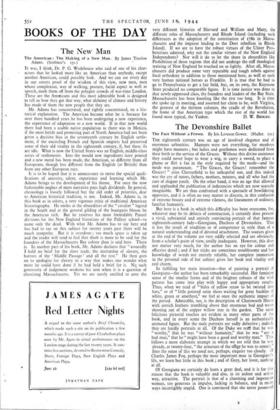BOOKS OF THE DAY
The New Man
IT was, I think, Dr. P. G. Wodehouse who said of one of his char- acters that he looked more like an American than anybody, except another American, could possibly look. And we can see every day in our streets proof of the wisdom of this view, new men, men whose complexion, way of walking, posture, facial aspect as well as speech, mark them off from the polyglot crowds of war-time London. These are the Americans and this most admirable book is designed to tell us how they got that way, what alchemy of climate and history has made of them the new people that they are.
Mr. Adams has concentrated, and rightly concentrated, on a his- torical explanation. The American became what he is because for over three hundred years he has been undergoing a new experience, the experience of adaptation to a new world. If in that new world there had been a usable native population as there was in Mexico, if the most fertile and promising part of North America had not been given a decisive bias in the seventeenth century by English settle- ment, if the encircling French and Spanish empires had preserved some of their old vitality in the eighteenth century, if, but these ifs are idle. What is now the United States was an- English, middle-class series of settlements. Into the mould new ingredients have poured and a new metal has been made, the American, so different from all Europeans, though less different from the English (or British) than from any other European race.
It is to be hoped that it is unnecessary to stress the special quali- fications of ancestry, talent, experience and learning which Mr. Adams brings to the development of his theme. For once the now fashionable neglect of mere narrative pays high dividends. In general, chronology is loosely followed but the old order of priorities, dear to American historical tradition, is not. Indeed, Mr. Adams is, in this book as in others, a very vigorous critic of traditional American historiography. He smiles at the absurdities of the " cavalier " legend in the South and at the general gilding of the bourgeois blason by the American rich. But he reserves his most formidable Panzer divisions for the New England historians of the Palfrey school—to name only the dead. With what Mr. Adams has to say here and has had to say on this subject for twenty years past there will be much sympathy. But it is overdone; much space is taken up and the reader will tend to feel that tere is more to be said for the founders of the Massachusetts Bay colony than is said here. There is. In another part of his book, Mr. Adams declares that " assuredly I hold no brief for the slave trade, the institution of slavery, the horrors of the Middle Passage' and all the rest." He then goes on to apologise for slavery in a way that makes one wonder what more he could have done if he had held a brief for it. No such generosity of judgement weakens his arm when it is a question of chastising Massachusetts. Yet we are surely entitled to note the
very different histories of Harvard and William and Mary, the different roles of Massachusetts and Rhode Island (including such differences as the adoption of the constitution of 1780 in Massa- chusetts and the impasse leading to the Dorr rebellion in Rhode Island). If we are to have the robust virtues of the Ulster Pres- byterians admired, why not the similar virtues of the New England Independents? Nor will it do to let the share in absurdities like Prohibition of those regions that did not undergo the stiff theological training of New England be touched on so lightly. After all, Massa- chusetts did produce some very reputable and tough rebels against local orthodoxy in addition to those mentioned here, as well as such very human national heroes as Franklin. It is true that he had to go to Pennsylvania to get a fair field, but, on its own, the Keystone State produced no comparable figure. It is time justice was done to that newly oppressed class, the founders and leaders of the Bay State. Massachusetts has been kneeling like the rest too long. It -is time she spoke Op in meeting, and asserted her claim to be, with Virginia, the greatest of the thirteen colonies, the cradle of the Revolution, the home of that American type which the rest of the world has


























 Previous page
Previous page